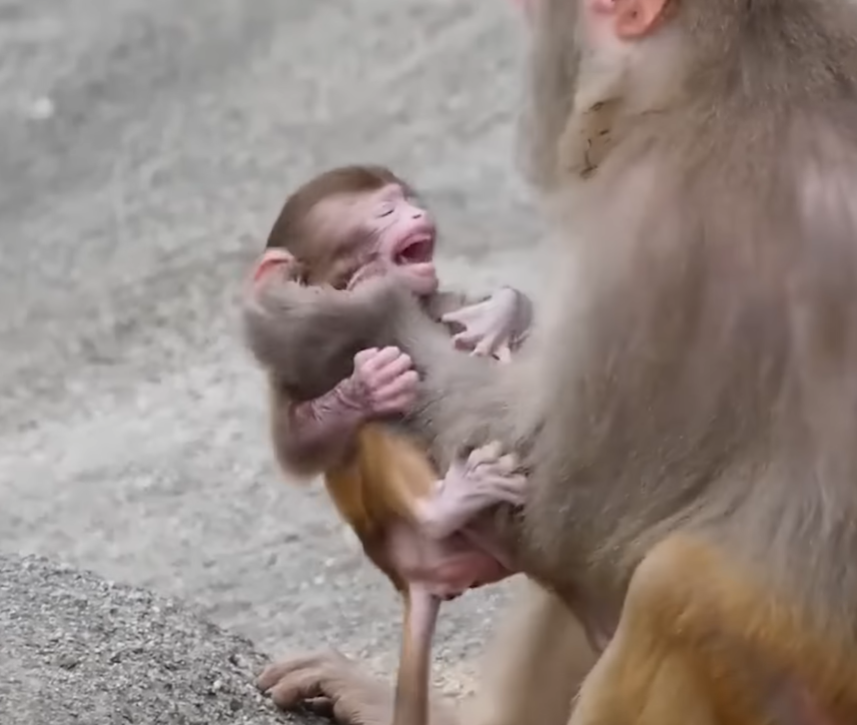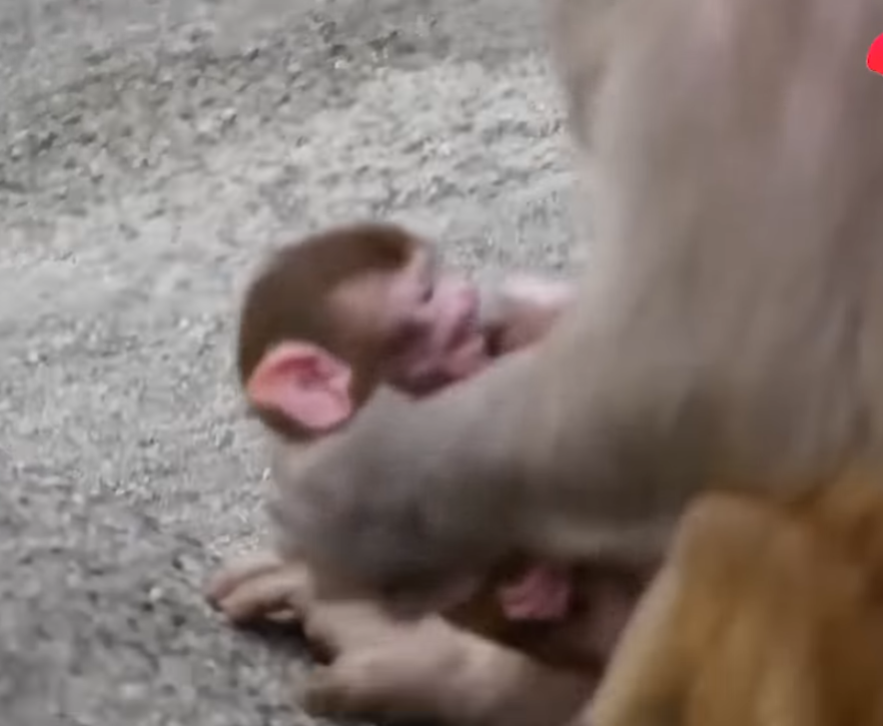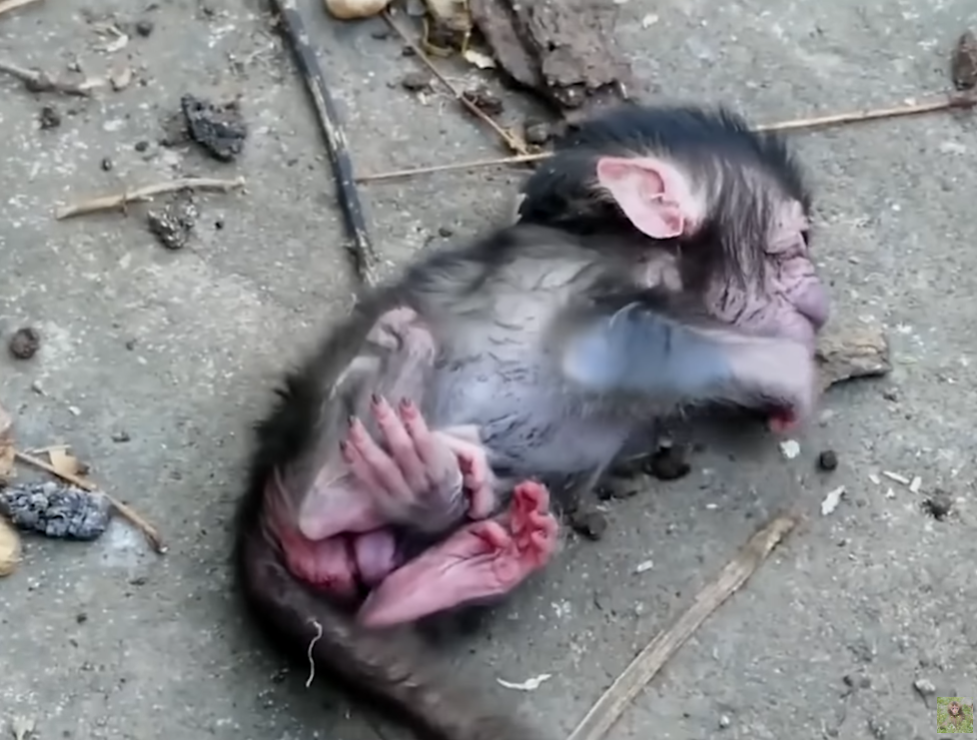

In the wild, life can be unpredictable and unforgiving. For the smallest and most vulnerable members of the animal kingdom, even the slightest misstep can have dire consequences. One such heart-wrenching moment occurred when a newborn baby monkey, barely able to walk, fell from a tree branch, its tiny body hitting the ground with a sickening thud. As it lay there, stunned and helpless, the baby screamed out for the one creature that could offer comfort and protection—its mother.
The mother monkey, having been a few branches above, reacted immediately to the sound of her baby’s cries. But in that instant, time seemed to stand still. The newborn’s desperate calls echoed through the trees, yet there was a heartbreaking uncertainty about whether the mother could reach her in time, or if she even could offer the care the baby so desperately needed.
The life of a newborn monkey is a delicate balance between exploration and the constant threat of danger. From the moment they are born, baby monkeys rely on their mothers for nearly every aspect of their survival—food, protection, warmth, and guidance. Their mothers carry them through the early weeks of life, ensuring their safety by holding them tightly to their bodies while they navigate the treetops.

But even with this constant care, the environment can be unforgiving. In this particular instance, the baby monkey had been carefully cradled by its mother as they traveled through the dense forest. However, in the chaos of moving from one branch to another, the tiny monkey slipped and fell. For a newborn with little muscle strength and still-developing coordination, such a fall was incredibly dangerous. The baby landed hard on the ground below, stunned by the impact, its small limbs shaking in fear and pain.
The infant’s shrill cries were unmistakable, echoing through the forest. It was a sound that pierced the heart, a cry that spoke not only of pain but of a desperate plea for safety. The newborn monkey’s instinct was simple—reach for its mother, the protector of its fragile life. But in that moment, the separation between the baby and its mother was a painful reminder of how vulnerable this tiny creature was in the vast and often hostile world it inhabited.
The mother monkey’s response was immediate, but the challenges she faced in trying to retrieve her baby were not simple. The branches she had to navigate were high and dense, making it difficult for her to move quickly. She screeched in alarm, calling to her baby as she swung from branch to branch with incredible speed and precision. In the distance, other members of the troop could be heard calling out, but their concern was distant compared to the desperate urgency in the mother’s own cries.
In the meantime, the baby monkey, still on the ground, continued to scream, each call more frantic than the last. The cries were not just calls for attention; they were a primal, instinctual plea for survival. In the wild, the cries of a fallen infant can attract the attention of predators, and without the protection of its mother, the baby was at risk. The anxiety and fear in those moments were palpable, both for the baby and for the watching onlookers who felt the helplessness of the situation.
The mother, finally reaching the ground, scooped up her baby with expert care, cradling it close to her body. She made sure to check for any signs of injury, gently grooming the baby and offering reassurance with every soft touch. Her maternal instincts were in full force as she calmed her little one, ensuring it was safe and secure once again.

The scene was a powerful reminder of the delicate nature of life in the wild. The bond between mother and baby monkeys is essential for survival. The mother’s protective instincts and the baby’s cries for help were a reflection of the deep emotional and physical connection that exists in the animal kingdom. For the baby monkey, the fall was a moment of vulnerability, but thanks to the unwavering love and care of its mother, the crisis was averted.
This incident also sheds light on the challenges young animals face as they begin their lives in the wild. Though they may seem strong and resilient, the reality is that survival is a constant battle for the smallest and weakest members of any species. The support of the mother is crucial, and the connection between parent and child is often the only thing that ensures the young will live to see another day.
As the mother carried her baby back up into the safety of the treetops, the cries slowly subsided. The baby, now safe in the protective embrace of its mother, relaxed. Though the memory of the fall would linger, the presence of the mother gave the baby the comfort it needed to heal, both physically and emotionally. This bond, forged through love and survival, would continue to strengthen as the baby monkey grew, learning the ways of the forest under the watchful eye of its mother.
In the end, the story of the newborn baby monkey and its cry for help is a reminder of the importance of care, compassion, and protection. It is also a poignant reminder of how fragile life can be, and how a mother’s love is often the most powerful force in the world.